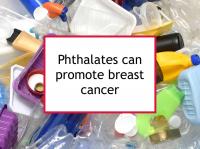Phthalates are used to make plastics more pliable and are also used as stabilizing agents in some personal care products. Phthalates such as di(n-butyl) phthalate (DBP) and diethyl phthalate (DEP), which are used in lotions and creams, have been shown to be absorbed through the skin. Now a new review has summarized the known links between phthalate exposure and breast cancer.
Phthalate exposure
Some common phthalates appear to be capable of promoting breast cancer at very low levels. In one study, ER+/PR+ breast cancer cells were exposed to various concentrations of butyl benzyl phthalate (BBP), DBP, and di(20ethylhexyl) phthalate (DEHP). Proliferation was found to be significantly increased even at very low concentrations. In addition, estrogen receptor alpha expression was notably amplified by treatment with BBP, DBP, and DEHP.
In fact, phthalates can induce tumor cell cycle progression and proliferation, as well as inhibit apoptosis of normal breast cells, even at levels of exposure below their no-observed-adverse-effect concentration (as specified by current standards). In addition, while phthalates have been found to have estrogen-like effects, they have also been reported to induce proliferation of hormone receptor negative (ER-) breast cancer cells independent of any estrogenic effects.
Food packaging (especially soft plastic food packaging), lotions, creams, hair products and other personal care products are the main sources of phthalate exposure for most people. However, disposable diapers, vaginal douching, sanitary pads, and coffee brewed using coffee capsules can be significant sources of exposure for some individuals.
Latest review finds phthalates promote tumor progression
The review referenced above was designed to investigate the links between phthalate exposure and the initiation, progression, and metastasis of breast cancer. Human exposure to phthalates occurs primarily through ingestion, inhalation, and the skin. The impact of these endocrine disruptors is heightened during important developmental windows, including prenatal development and breast development.
In the review, the authors conducted a wide-ranging examination of the cancer-promoting activities of phthalates, including estrogen receptor signaling, oncogenic pathway activation, promotion of cancer stem cell-like properties, and induction of treatment resistance. Among their important findings:
- Phthalates activate important breast tumorigenesis pathways, including PI3K/AKT/mTOR and CREB
- Phthalates increase oncogene expression, tumor cell survival and reduced apoptosis (programmed cell death)
- Phthalates act as xenoestrogens (man-made compounds that bind to and activate estrogen receptors), disrupting estrogen signaling and promoting tumor progression
- Phthalates induce EMT (epithelial-mesenchymal transition, a crucial event in the tumor invasion process) and angiogenesis (new blood vessel formation), thereby facilitating metastasis.
The authors comment that their work provides important insights into phthalate-driven mechanisms in breast cancer "that can inform future research directions, public health strategies, and regulatory efforts aimed at mitigating environmental cancer risks."
Please see our article on phthalates and breast cancer and the endocrine disruptor tag for more information.
